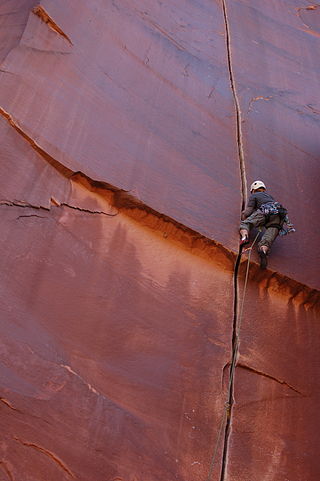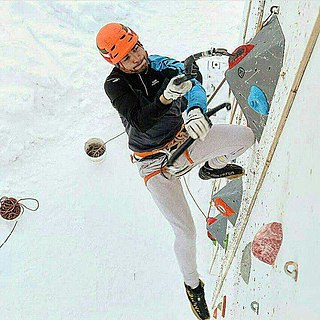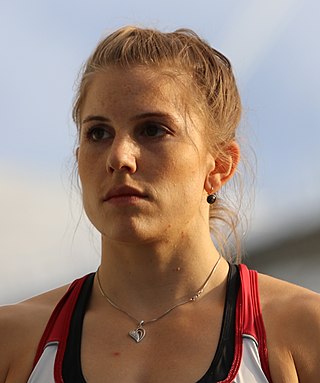
Bouldering is a form of rock climbing that is performed on small rock formations or artificial rock walls without the use of ropes or harnesses. While bouldering can be done without any equipment, most climbers use climbing shoes to help secure footholds, chalk to keep their hands dry and to provide a firmer grip, and bouldering mats to prevent injuries from falls. Unlike free solo climbing, which is also performed without ropes, bouldering problems are usually less than six metres (20 ft) tall. Traverses, which are a form of boulder problem, require the climber to climb horizontally from one end to another. Artificial climbing walls allow boulderers to climb indoors in areas without natural boulders. In addition, bouldering competitions take place in both indoor and outdoor settings.

Many climbing routes have a grade that reflects the technical difficulty—and in some cases the risks and commitment level—of the route. The first ascensionist can suggest a grade, but it will be amended to reflect the consensus view of subsequent ascents. While many countries with a strong tradition of climbing developed grading systems, a small number of grading systems have become internationally dominant for each type of climbing, which has contributed to the standardization of grades worldwide. Over the years, grades have consistently risen in all forms of climbing, helped by improvements in climbing technique and equipment.

Sport climbing is a type of free climbing in rock climbing where the lead climber clips into pre-drilled permanent bolts for their protection while ascending a route. Sport climbing differs from the riskier traditional climbing where the lead climber has to insert temporary protection equipment while ascending.

Rock climbing is a climbing sports discipline that involves ascending routes consisting of natural rock in an outdoor environment, or on artificial resin climbing walls in a mostly indoor environment. Routes are chronicled in guidebooks, and on online databases, with the details of how to climb the route, and who made the first ascent and the coveted first free ascent. Climbers will try to ascend a route onsight, however, a climber can spend years projecting a route before they make a redpoint ascent.

Competition climbing is a form of regulated rock climbing competition held indoors on purpose-built artificial climbing walls. The three competition climbing disciplines are lead climbing, bouldering, and speed climbing. The result of multiple disciplines can be used in a "combined" format to determine an all-round winner. Competition climbing is sometimes called "sport climbing", which is the name given to pre-bolted lead climbing.

In the history of rock climbing, the three main sub-disciplines – bouldering, single-pitch climbing, and big wall climbing – can trace their origins to late 19th-century Europe. Bouldering started in Fontainebleau, and was advanced by Pierre Allain in the 1930s, and John Gill in the 1950s. Big wall climbing started in the Dolomites, and was spread across the Alps in the 1930s by climbers such as Emilio Comici and Riccardo Cassin, and in the 1950s by Walter Bonatti, before reaching Yosemite where it was led in the 1950s to 1970s by climbers such as Royal Robbins. Single-pitch climbing started pre-1900 in both the Lake District and in Saxony, and by the late-1970s had spread widely with climbers such as Ron Fawcett (Britain), Bernd Arnold (Germany), Patrick Berhault (France), Ron Kauk and John Bachar (USA).
The IFSC Climbing World Championships are the biennial world championship event for competition climbing that is organized by the International Federation of Sport Climbing (IFSC). This event determines the male and female world champions in the three disciplines of competition climbing: competition lead climbing, competition bouldering, and competition speed climbing. Since 2012, a combined ranking is also determined, for climbers competing in all disciplines, and additional medals are awarded based on that ranking. The first event was organized in Frankfurt in 1991.
USA Climbing is the national governing body of the sport of competition climbing in the United States. As a 501(c)3 non-profit, they promote Sport Climbing which comprises three competition disciplines: bouldering, lead climbing, and speed climbing, in elite, youth and collegiate formats.

Angela "Angy" Eiter is an Austrian professional rock climber who specialises in competition climbing and sport climbing. In competition lead climbing, she won three IFSC World Cups in a row (2004–2006), and four IFSC World Championships. In 2011, she achieved her 25th win in World Cup and her 42nd podium. She is also one of the strongest sport climbers in the world, and in 2017, became the first-ever female in history to climb a 9b (5.15b) route, La Planta de Shiva. In 2020, she became the first-ever female in history to complete the first free ascent (FFA) of a 9b (5.15b) route, Madame Ching.
The IFSC Climbing European Championships are the biennial European championship for competition climbing organized by the International Federation of Sport Climbing (IFSC). The first competition was held in Frankfurt in 1992.

Jakob Schubert is an Austrian professional rock climber, specializing in competition climbing, sport climbing, and bouldering. He is a four-time World Champion and three-time World Cup winner in lead climbing. He is a two-time Olympic bronze medalist in the combined event.

Mohammad Reza Safdarian Korouyeh is an Iranian Rock climber and Ice climber. Safdarian has won the first Gold medal in Iran′s ice climbing history in the Ice Climbing World Tour at Rabenestin in Italy, and a Bronze medal in 2018 UIAA Ice Climbing World Tour. and a Bronze medal in 2019 UIAA Ice Climbing World Combined championships. and a Bronze medal in 2018 UIAA Ice Climbing World Cup Overall Ranking Lead. The International Climbing and Mountaineering Federation named him the "History Boy". He has participated in 27 World Cups, World Championships and Asian Championships since 2013.
The 2007 IFSC Climbing World Championships, the 9th edition, were held in Aviles, Spain from 17 to 23 September 2007. It was the first Climbing World Championships organized by the International Federation of Sport Climbing (IFSC).

Petra Klingler is a Swiss rock climber who specializes in competition climbing. Known as a versatile climber, she competes in a wide range of competitive events, including competition bouldering, competition speed climbing, competition lead climbing, and also competition ice climbing.
The 2003 UIAA Climbing World Championships, the 7th edition, were held in Chamonix, France from 9 to 13 July 2003. It was organized by the Union Internationale des Associations d'Alpinisme (UIAA). The championships consisted of lead, speed, and bouldering events.
The 2001 UIAA Climbing World Championships, the 6th edition, were held in Winterthur, Switzerland from 5 to 8 September 2001. It was organized by the Union Internationale des Associations d'Alpinisme (UIAA). The championships consisted of lead, speed, and bouldering events. Bouldering was added as a new event.
The 1999 UIAA Climbing World Championships, the 5th edition, were held in Birmingham, United Kingdom from 2 to 3 December 1999. It was organized by the Union Internationale des Associations d'Alpinisme (UIAA). The championships consisted of lead and speed events.
The 1997 UIAA Climbing World Championships, the 4th edition, were held in Paris, France, from 31 January to 1 February 1997. It was organized by the Union Internationale des Associations d'Alpinisme (UIAA). The championships consisted of lead and speed events.
The 1995 UIAA Climbing World Championships, the 3rd edition, were held in Geneva, Switzerland from 5 to 6 May 1995. It was organized by the Union Internationale des Associations d'Alpinisme (UIAA). The championships consisted of lead and speed events.
The 1991 UIAA Climbing World Championships, the first edition, were held in Frankfurt, Germany from 1 to 2 October 1991. It was organized by the Union Internationale des Associations d'Alpinisme (UIAA). The championships consisted of lead and speed events.









